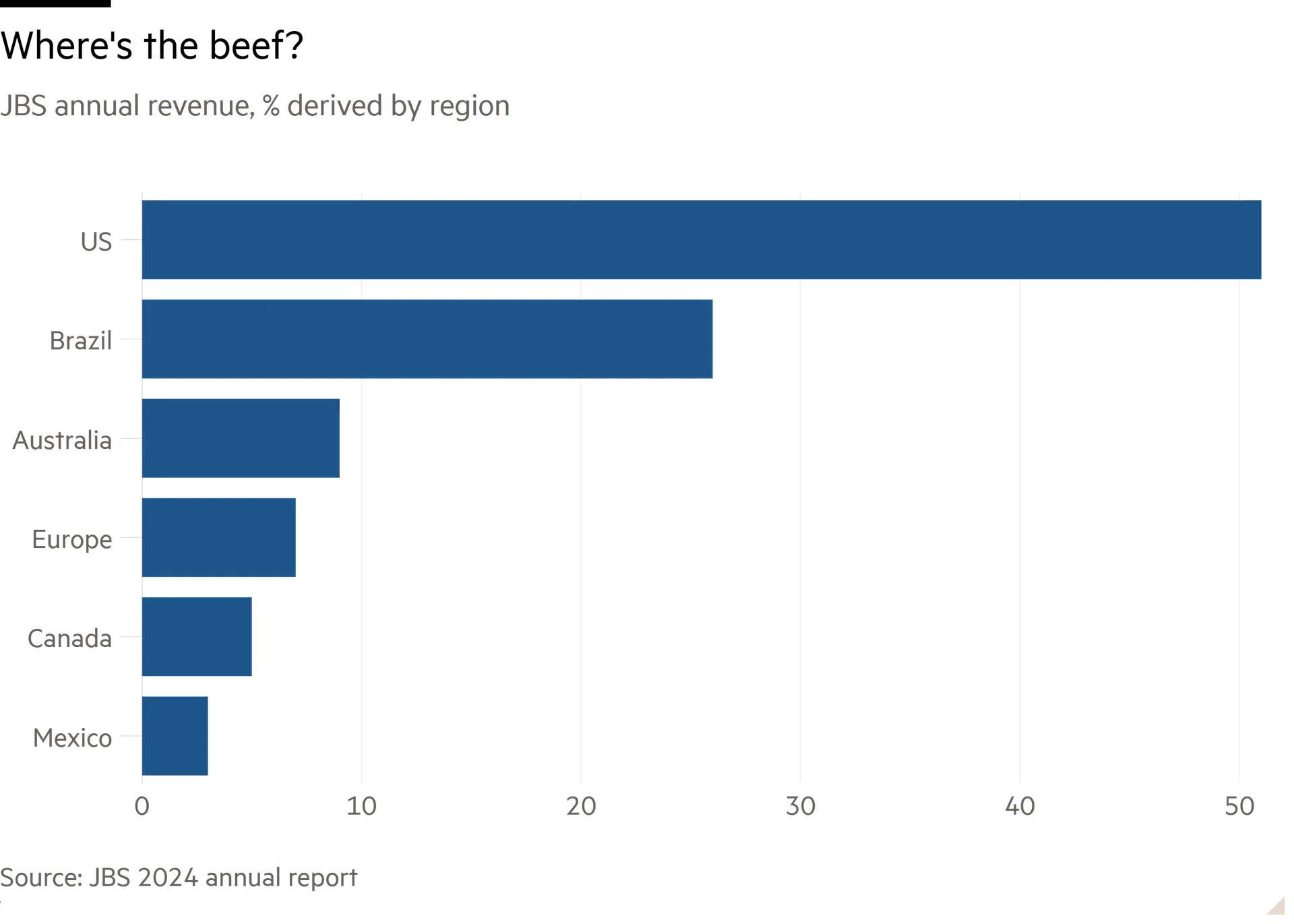尊敬的用户您好,这是来自FT中文网的温馨提示:如您对更多FT中文网的内容感兴趣,请在苹果应用商店或谷歌应用市场搜索“FT中文网”,下载FT中文网的官方应用。
American meat eaters may not have heard of JBS, but chances are they have sampled its wares. Now, the Brazilian meat processor, the largest in the world, wants them to sample its shares, too.
美国肉食者可能没听说过JBS,但很可能品尝过它的产品。现在,这家全球最大的巴西肉类加工企业也希望他们能购买其股票。
JBS supplies much of the beef, pork and poultry that ends up on American plates, and the reliance is mutual. More than half of the $77.2bn in revenue it pulled in last year came from the US. That exposure is one reason the company has long coveted a US share listing. Having pursued the idea on and off for close to a decade, the company finally got the green light from regulators and its shareholders to move its main stock listing from Brazil to the US.
美国人餐桌上的大部分牛肉、猪肉和家禽都是由JBS供应的,这种依赖是相互的。该公司去年772亿美元的收入中有一半以上来自美国。这也是该公司长期以来渴望在美国上市的原因之一。经过近十年断断续续的努力,该公司终于获得了监管机构和股东的绿灯,将其主要股票上市地从巴西转移到了美国。

The company thinks the move will help its stock, which trades at a sharp discount to US rivals, fetch a higher valuation as well as give the company access to cheaper funding.
该公司认为,此举将有助于其股票获得更高的估值——目前其股价与美国竞争对手相比大幅折价——同时还能让公司获得更低成本的融资。
The shares will not be palatable to everyone, though. The founding Batista family, through its investment vehicles, is the largest shareholder in JBS with a 48 per cent stake. The planned issue of supervoting shares, offered disproportionately to the Batista family, could leave it with 85 per cent of votes.
不过,并非所有人都买账。创始人巴蒂斯塔(Batista)家族通过其投资工具成为JBS的最大股东,持有48%的股份。计划发行的超级投票权股份将以不成比例的方式分配给巴蒂斯塔家族,可能会使其拥有85%的投票权。
Shareholder advisory firms ISS and Glass Lewis both recommended holders of JBS’s current Brazilian shares to vote against the dual listing — to no avail. Long-standing environmental concerns over the impact of cattle ranching on the Amazon rainforest and a bribery scandal that resulted in the US Securities and Exchange Commission hitting JBS and the Batista brothers with multimillion-dollar penalties could keep the shares off the menus of ESG-minded institutional investors.
股东咨询公司ISS和Glass Lewis均建议持有JBS当前巴西股票的股东投票反对双重上市——但未能奏效。长期以来,外界一直担忧养牛业对亚马逊的环境影响,以及一桩贿赂丑闻导致美国证券交易委员会(US Securities and Exchange Commission)对JBS公司及巴蒂斯塔兄弟处以数百万美元罚款,这些因素可能会让注重ESG的机构投资者对该公司股票望而却步。
Even without these oddities, selling meat is a tough business. High grain and cattle prices are driving up costs for meatpackers. A tough economy also means the scope to pass on the higher costs to consumers has become more limited. While 2024 revenue at JBS was up by a fifth since 2021, profitability is 50 per cent lower.
即便没有这些异常情况,肉类销售本身就是一门艰难的生意。高昂的谷物和牲畜价格推高了肉类加工商的成本,而经济不景气也让企业将成本上涨转嫁给消费者的空间变得更小。虽然JBS公司2024年的收入比2021年增长了20%,但盈利能力却下降了一半。
Despite the run-up in share price in the wake of its US listing approval, JBS currently trades on just five times EV to ebitda. By contrast, Tyson Foods is on a multiple of nine times, while Smithfield Foods and Hormel Foods are on seven and 12 times, respectively A US listing, by virtue of potential index inclusion and lower funding costs, should help narrow this valuation gap.
尽管在美国上市获批后股价有所上涨,但目前JBS的企业价值倍数(企业价值与息税折旧摊销前利润(EBITDA)之比)仅为5倍。相比之下,泰森食品公司(Tyson Foods)的为9倍,史密斯菲尔德食品(Smithfield Foods)和荷美尔食品(Hormel Foods)分别为7倍和12倍。
Even then, compared with US rivals, JBS’s business mix leans more towards low-margin beef processing instead of higher-margin processed foods. Acquisitions might help. To close the valuation gap fully, Brazil’s king of beef will have to change much more than its stock market listing.
即便如此,与美国竞争对手相比,JBS的业务结构更偏向于低利润的牛肉加工,而不是高利润的加工食品。收购可能会有所改善。要完全缩小估值差距,这家巴西的牛肉之王需要改变的不仅仅是其股票上市地。